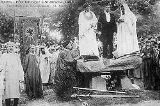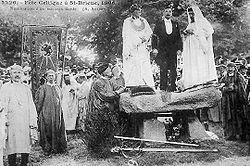
Breton Regionalist Union
Encyclopedia
The Breton regionalist union (Union Régionaliste Bretonne or URB), was a Breton cultural and political organisation created August 16 1898. It was a broadly conservative grouping dedicated to preserving Breton cultural identity and regional independence. It expressed the ideology of mainly middle-class and aristocractic groups to secure continuity in local administration and Breton culture.
, following festivals devoted to Breton culture. It was chaired by Anatole Le Braz
, with the Marquis de Estourbeillon. François Vallée was named president of the section dedicated to Breton language
and literature, with François Jaffrenou as secretary. Other important figures were the writers Alphonse de Chateaubriant
, Louis Tiercelin
and Charles Le Goffic
. Sympathisers, if not supporters, included the politician Albert de Mun, the poet and art critic Jean Le Fustec
, the linguist and grammarian François Vallée, the composer Louis Bourgault-Ducoudray, the singer Théodore Botrel
, the scholar Rene de Kerviler, the composer Guy Ropartz and many others.
The prominent position held by the nobility and the clergy quickly alienated some of the more radical members and led to the foundation of the alternative Association des bleus de Bretagne (Blues of Brittany) in 1899, which had a more liberal-progressive agenda. Nevertheless the two groups were never in open conflict. Le Braz was a member of both.
The URB declared socialism to be its enemy. Jean-Marie Déguignet, in his Memoirs of a Breton Peasant, wrote that the group was dominated by 'nobles and clerics' who wanted no input from the lower classes about their own culture.
 As a result of the group's work, the Gorsedd of Brittany was created August 31 1900 in Guingamp
As a result of the group's work, the Gorsedd of Brittany was created August 31 1900 in Guingamp
, following a meeting of the URB. Following Welsh examples, the group sought to revive Celtic bardic traditions. Each participant adopted a pseudonym and the title of bard. The members of Gorsedd promoted Breton culture either in the sections of the URB, or in the Gorsedd itself. This produced the Ti Kaniri breiz (House of Breton Song).
left the URB with Emile Masson
, Camille Le Mercier d'Erm
, François Vallée and Loeiz Herrieu to create the Breton Regionalist Federation. Le Mercier d'Erm and Masson went on to found the Breton Nationalist Party
Yann Fouéré
was its vice-president from 1939 to 1945. After 1940, several of its members took part in "Sao Breiz", the Breton section of de Gaulle's Free French forces.
A bulletin edited by the Marquis of Estourbillon appeared from 1902 to 1943. It did not appear during World War I
, the majority of the contributors being at the front.
Origins
The Union was created in August 1898, in MorlaixMorlaix
Morlaix is a commune in the Finistère department of Brittany in northwestern France. It is a sub-prefecture of the department.-Leisure and tourism:...
, following festivals devoted to Breton culture. It was chaired by Anatole Le Braz
Anatole Le Braz
Anatole le Braz, the "Bard of Brittany" was a Breton folklore collector and translator. He was highly regarded amongst both European and American scholars, and known for his warmth and charm....
, with the Marquis de Estourbeillon. François Vallée was named president of the section dedicated to Breton language
Breton language
Breton is a Celtic language spoken in Brittany , France. Breton is a Brythonic language, descended from the Celtic British language brought from Great Britain to Armorica by migrating Britons during the Early Middle Ages. Like the other Brythonic languages, Welsh and Cornish, it is classified as...
and literature, with François Jaffrenou as secretary. Other important figures were the writers Alphonse de Chateaubriant
Alphonse de Châteaubriant
Alphonse Van Bredenbeck de Châteaubriant was a French writer who won the Prix Goncourt in 1911 for his novel Monsieur de Lourdines and Grand prix du roman de l'Académie française for La Brière in 1923....
, Louis Tiercelin
Louis Tiercelin
Louis Tiercelin , was a French writer, poet and playwright associated with the Breton cultural renaissance of the early 20th century....
and Charles Le Goffic
Charles Le Goffic
Charles Le Goffic was a French poet, novelist and historian whose influence was especially strong in his native Brittany. He was a member of the Académie française.-Biography:...
. Sympathisers, if not supporters, included the politician Albert de Mun, the poet and art critic Jean Le Fustec
Jean Le Fustec
Jean Le Fustec was a Breton bard, and the first Archdruid of the Goursez Vreizh . He is also known by his Breton language name Yann ab Gwilherm and his Druidic name Lemenik....
, the linguist and grammarian François Vallée, the composer Louis Bourgault-Ducoudray, the singer Théodore Botrel
Théodore Botrel
Jean-Baptiste-Théodore-Marie Botrel was a French singer-songwriter, poet and playwright. He is best known for his popular songs about his native Brittany, of which the most famous is La Paimpolaise. During World War I he became France's official "Bard of the Armies".-Life:Born in Dinan, Botrel was...
, the scholar Rene de Kerviler, the composer Guy Ropartz and many others.
The prominent position held by the nobility and the clergy quickly alienated some of the more radical members and led to the foundation of the alternative Association des bleus de Bretagne (Blues of Brittany) in 1899, which had a more liberal-progressive agenda. Nevertheless the two groups were never in open conflict. Le Braz was a member of both.
The URB declared socialism to be its enemy. Jean-Marie Déguignet, in his Memoirs of a Breton Peasant, wrote that the group was dominated by 'nobles and clerics' who wanted no input from the lower classes about their own culture.
Gorsedd

Guingamp
Guingamp is a commune in the Côtes-d'Armor department in Brittany in northwestern France.-Population:Inhabitants of Guingamp are called guingampais.-Breton language:...
, following a meeting of the URB. Following Welsh examples, the group sought to revive Celtic bardic traditions. Each participant adopted a pseudonym and the title of bard. The members of Gorsedd promoted Breton culture either in the sections of the URB, or in the Gorsedd itself. This produced the Ti Kaniri breiz (House of Breton Song).
Later activities
In 1912, Maurice DuhamelMaurice Duhamel
Maurice Duhamel , was the pen-name of Maurice Bourgeaux, a Breton musician, writer and activist who was a leading figure in Breton nationalism and federalist politics in the years before World War II.-Early life:...
left the URB with Emile Masson
Émile Masson
Émile Masson was a Breton writer and thinker. He also used the pseudonyms Brenn, Ewan Gweznou, and Ion Prigent.Born in Brest, he was not brought up speaking Breton, but acquired the language in later life. He received two degrees and moved to Paris...
, Camille Le Mercier d'Erm
Camille Le Mercier d'Erm
Camille Le Mercier d'Erm was a French poet, historian and Breton nationalist. He later adopted the neo-Bardic name Kammermor. He is also known as Kamil Ar Merser 'Erm, the Breton language form of his name...
, François Vallée and Loeiz Herrieu to create the Breton Regionalist Federation. Le Mercier d'Erm and Masson went on to found the Breton Nationalist Party
Breton Nationalist Party
The Breton Nationalist Party was a French political party that advocated independence for Brittany. It existed from 1911 to 1914.-Origins:...
Yann Fouéré
Yann Fouéré
Yann Fouéré was a Breton nationalist and an European federalist. He was born as Jean-Adolphe Fouéré in Aignan, Gers....
was its vice-president from 1939 to 1945. After 1940, several of its members took part in "Sao Breiz", the Breton section of de Gaulle's Free French forces.
A bulletin edited by the Marquis of Estourbillon appeared from 1902 to 1943. It did not appear during World War I
World War I
World War I , which was predominantly called the World War or the Great War from its occurrence until 1939, and the First World War or World War I thereafter, was a major war centred in Europe that began on 28 July 1914 and lasted until 11 November 1918...
, the majority of the contributors being at the front.

